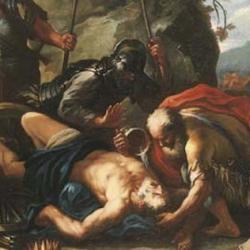David’s ecstatic prayer in 1 Chronicles 29 – the last words he speaks in Chronicles – includes this notable verse: “Who am I and who are my people we we should have strength to volunteer offerings like this? For from you comes all, and from your hand we give to you” (v. 14).
David refers to the vast outpouring of resources for the temple – thousands of talents of gold, silver, bronze, iron (vv. 6-8). That is the “voluntary gift” that David celebrates. He certainly commends the people for their generosity, but more fundamentally he acknowledges that their generosity is from Yahweh.
The second clause is a dense five-word piece of Hebrew poetry, alternating words that end with the second-person pronomial suffix, –k:
A. From you (mimeka)
B. the all
A’. and from Your hand (miyyadka)
B’. we give
A”. to You (lak).
God is on both sides of the exchange. Everything comes from Him, and what Israel gives back is only what has come from Yahweh’s hand. That description doesn’t quite capture it, though. It suggests that God hands things over into our possession, and then we, by some power of our own, return gifts to Him.
David suggests a tighter relationship between God and the return gift. Yahweh is the source of Israel’s generosity, and so even the strength to make a return gift, the impulse to give back to the Giver, comes from the Giver. It’s not merely that the return gift comes from the hand of Yahweh; the return giving is also from Him.
Another use of “hand” highlights another dimension of Israel’s gift-giving. David calls on the people to make donations to the temple by asking who will “fill his hand this day to Yahweh” (v. 5). “Fill the hand” is mallo’oth yado, a Mosaic idiom for “ordination” of priests. Aaron and his sons were ordained by having their hands consecrated for tabernacle service and filled with food-gifts to offer on the altar of Yahweh. In Chronicles, Israel doesn’t receive anything. They fill their hands by donating gold, silver, and other precious metals. They are consecrated as a priestly people by handing over their goods; they fill their hands by emptying them. This consecration too is an act of God: Yahweh claims them as holy by inspiring them to generosity.
Verse 14 is set within a somewhat larger chiastic structure that stretches from verses 14-16:
A. From you all
B. from your hand we give to you
C. We are sojourners, tenants;
C’. our life is shadow, we have no hope.
B’. Abundance from your hand
A’. to you all.
From Him and to Him are all things: It has a familiar ring to it. It’s as if nothing ever leaves the hand of God, and yet the things that we receive become genuinely ours, subject always to a double possessive (His things, and mine). For creatures, there is no possession but double possession.
The Lord encircles the entire process of gift and return gift. He underwrites our exchanges and reciprocity.















